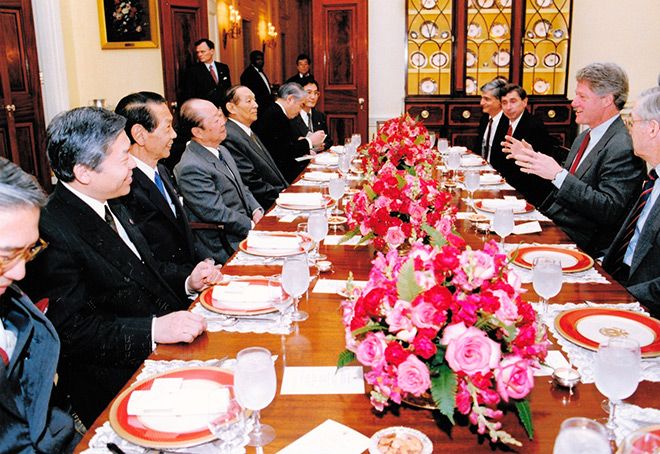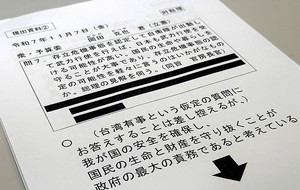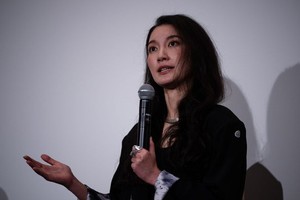By NAOTAKA FUJITA/ Senior Staff Writer
January 6, 2025 at 17:09 JST
 U.S. President Bill Clinton, second from right, talks with Japanese Prime Minister Kiichi Miyazawa, fourth from left, in a lunch meeting held at the White House in Washington, D.C., in April 1993. (Provided by Yukio Takeuchi, former vice minister of foreign affairs)
U.S. President Bill Clinton, second from right, talks with Japanese Prime Minister Kiichi Miyazawa, fourth from left, in a lunch meeting held at the White House in Washington, D.C., in April 1993. (Provided by Yukio Takeuchi, former vice minister of foreign affairs)
Japanese Prime Minister Kiichi Miyazawa expressed concerns about China’s lack of democratization and its transformation into a military power in a summit with U.S. President Bill Clinton in 1993, according to newly released diplomatic records.
Miyazawa spoke frankly about his own perceptions in response to Clinton’s question on dealing with China at the Japan-U.S. summit held in Washington, D.C., in April 1993.
Clinton had won the previous year’s presidential election against incumbent George H.W. Bush.
He had criticized the Bush administration’s policy toward China as lenient since the Tiananmen Square massacre in 1989, when the Chinese government violently suppressed the democracy movement.
However, the records of the summit between Japan and the United States, released by the Foreign Ministry on Dec. 26, 2024, showed a more restrained Clinton three months after taking office.
It shows the U.S. president searching for the appropriate diplomatic distance to maintain from China while continuing his emphasis for economic ties between the two nations.
At that time, China’s GDP was around 10 percent that of the United States.
Regarding the renewal of the "most favored nation" (MFN) status, under which the United States grants China equal treatment in trade and other areas, Clinton said that the United States must not isolate China although there was strong support within his country for setting conditions for human rights improvements.
Asked for his opinion, Miyazawa told Clinton that he was in favor of the unconditional granting of the MFN status to China.
Miyazawa also noted that maintaining Hong Kong’s prosperity was important for introducing a market economy system to China, considering Hong Kong, which Britain was scheduled to return in 1997, was deepening economic exchanges with China.
On the other hand, Miyazawa also expressed concerns about China becoming a military power.
He said, “As the Chinese economy develops, there is plenty of room for China to exercise its military ambitions.”
He also added, “There is an assumption that democracy will take root as the Chinese people’s standard of living rises, but I am skeptical about it. There are no signs that China is becoming more democratic.”
Miyazawa continued, “For the time being, China does not pose a threat,” when asked by Clinton to what extent China would open up.
He said that “China is trying to bring the Olympics to Beijing in 2000, so it is going to remain pacifists for the time being. However, after that, there is no guarantee that it will remain so.”
The following year, Clinton announced that he would separate the issue of human rights abuses in China from granting MFN status to China.
In an effort to deepen economic ties with China, Clinton renewed the MFN repeatedly during his time in office until 2001. Criticism has persisted in the United States in recent years that such a policy toward China has led to China’s military rise in addition to its economic growth.
Meanwhile, Miyazawa’s view of China also wavered. In an interview with The Asahi Shimbun from 1994 to 1995, after stepping down as prime minister, he said, “I think China will take the path of becoming an economic superpower,” and “I do not think it has hegemonic tendencies.”
However, he became increasingly wary of China’s military expansion in the years following the interview.
In a speech delivered in 2001, Miyazawa proposed that Japan be allowed to exercise a limited right of collective self-defense to strengthen the response capabilities of Japan and the United States.




















A peek through the music industry’s curtain at the producers who harnessed social media to help their idols go global.
A series based on diplomatic documents declassified by Japan’s Foreign Ministry
Here is a collection of first-hand accounts by “hibakusha” atomic bomb survivors.
Cooking experts, chefs and others involved in the field of food introduce their special recipes intertwined with their paths in life.
A series about Japanese-Americans and their memories of World War II